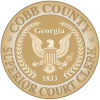You can now pay your fines and restitution online. Pay your fines at https://cobbcoga.ibcpayments.com/.
PLEASE BE ADVISED:
Due to changes with mail delivery/pickup times between the United States Postal Service and the County’s Mail Room, please make sure to send your documents well in advance of any potential deadlines. Also, please make sure to avoid e-filing late in the afternoon on the day of your deadline. The Cobb Superior Court Clerk’s Office makes every attempt to process filings timely and efficiently but we cannot be accountable for issues out of our control.
Effective July 1, 2023, Georgia House Bill 916 (2022), the “Superior and State Court Appellate Practice Act,” will repeal and replace Georgia’s complex notice of appeal and certiorari review statutes (former O.C.G.A. §§ 5-3-1 et seq.; 5-4-1 et seq.) with a unified “Petition for Review” procedure for appealing cases from a lower judicatory to superior or state court. O.C.G.A. §§ 5-3-1 to 5-3-21.
You can download the new Petition for Review form in the Fees & Forms section of our website.
Civil Cases:
Civil e-Filing (SB407)
Cases initiated on, and after, January 1, 2019, attorneys are required to e-File new cases in Superior and State Courts in Georgia. NO PAPER FILING.
Civil Cases are actions brought to enforce, redress, or protect private rights.
In general, they are all types of actions other than criminal proceedings. With the exception of family violence cases, these cases tend to be custom prepared to fit the particular circumstance in which the plaintiff was aggrieved. Everyone has the Constitutional Right to pursue legal actions on their own; however, because of the unfamiliarity of legal procedures, it would be wise to seek the advice of an attorney when pursuing litigation at the Superior Court level.
State law prohibits the Clerk and all deputy clerks from giving any type of legal advice.
The court requires the parties in Civil Cases to participate in the Court-Annexed ADR (Alternative Dispute Resolution) program.
The court requires that Divorcing Parents must attend the divorcing parents seminar, which is an educations seminar that focuses on the needs of the children involved. Information is available from Court Administration at 770-528-1809.
Criminal Cases:
A criminal felony case is a proceeding by which a person charged with a crime is brought to trial and either found not guilty or guilty and sentenced accordingly. In Georgia, all criminal felony cases are tried by the Superior Court of the county in which the crime is alleged to have been committed. The cases that fall into this category range from theft offenses to murder for which the prosecutor may seek the death penalty.
If you have questions about courts please call 770-528-1300.
